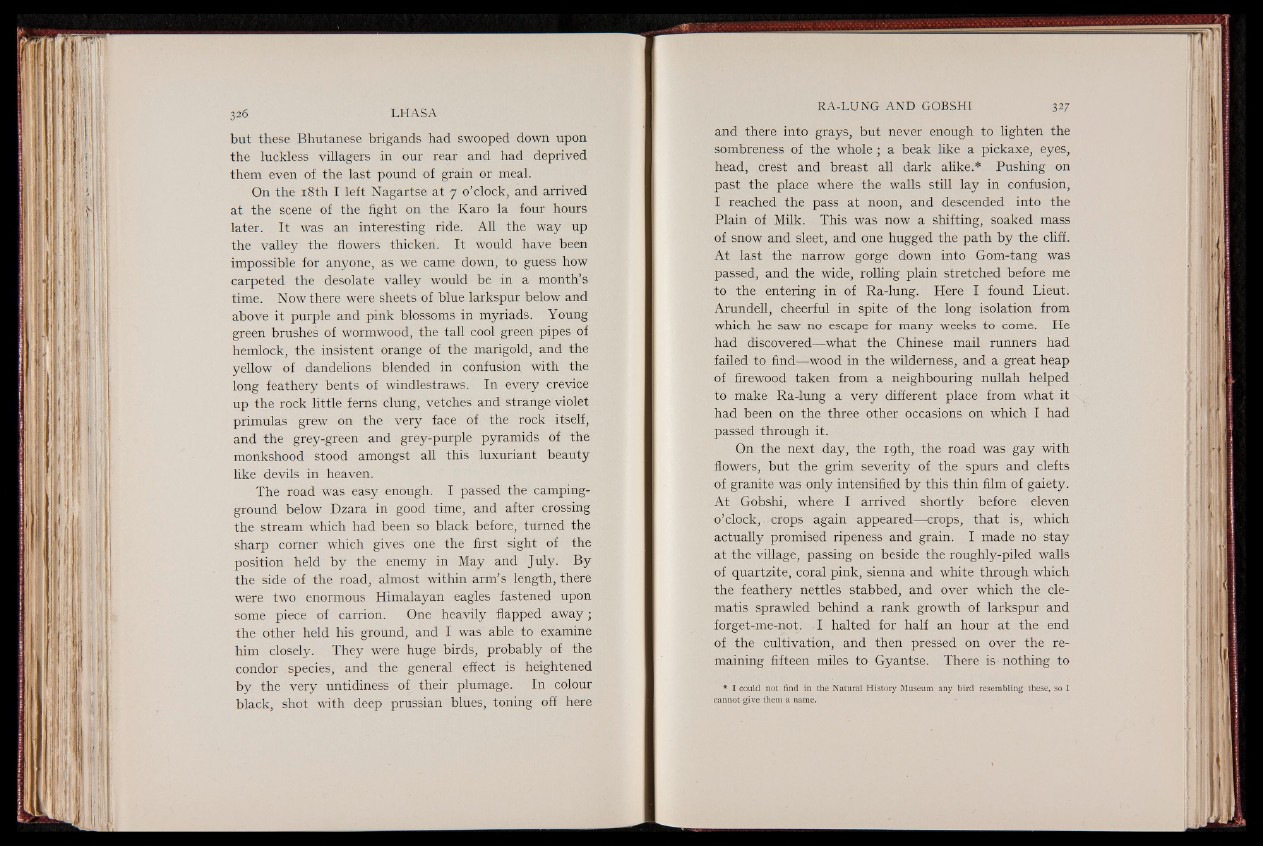
but these Bhutanese brigands had swooped down upon
the luckless villagers in our rear and had deprived
them even of the last pound of grain or meal.
On the 18th I left Nagartse at 7 o’clock, and arrived
at the scene of the fight on the Karo la four hours
later. It was an interesting ride. All the way up
the valley the flowers thicken. It would have been
impossible for anyone, as we came down, to guess how
carpeted the desolate valley would be in a month’s
time. Now there were sheets of blue larkspur below and
above it purple and pink blossoms in myriads. Young
green brushes of wormwood, the tall cool green pipes of
hemlock, the insistent orange of the marigold, and the
yellow of dandelions blended in confusion with the
long feathery bents of windlestraws. In every crevice
up the rock little ferns clung, vetches and strange violet
primulas grew on the very face, of the rock itself,
and the grey-green and grey-purple pyramids of the
monkshood stood amongst all this luxuriant beauty
like devils in heaven.
The road was easy enough. I passed the camping-
ground below Dzara in good time, and after crossing
the stream which had been so black before, turned the
sharp corner which gives one the first sight of the
position held by the enemy in May and July. By
the side of the road, almost within arm’s length, there
were two enormous Himalayan eagles fastened upon
some piece of carrion. One heavily flapped aw a y ;
the other held his ground, and I was able to examine
him closely. They were huge birds, probably of the
condor species, and the general effect is heightened
by the very untidiness of their plumage. In colour
black, shot with deep prussian blues, toning off here
and there into grays, but never enough to lighten the
sombreness of the whole ; a beak like a pickaxe, eyes,
head, crest and breast all dark alike.* Pushing on
past the place where the walls still lay in confusion,
I reached the pass at noon, and descended into the
Plain of Milk. This was now a shifting, soaked mass
of snow and sleet, and one hugged the path by the cliff.
At last the narrow gorge down into Gom-tang was
passed, and the wide, rolling plain stretched before me
to the entering in of Ra-lung. Here I found Lieut.
Arundell, cheerful in spite of the long isolation from
which he saw no escape for many weeks to come. He
had discovered— what the Chinese mail runners had
failed to find— wood in the wilderness, and a great heap
of firewood taken from a neighbouring nullah helped
to make Ra-lung a very different place from what it
had been on the three other occasions on which I had
passed through it.
On the next day, the 19th, the road was. gay with
flowers, but the grim severity of the spurs and clefts
of granite was only intensified by this thin film of gaiety.
At Gobshi, where I arrived shortly before eleven
o’clock, .crops again appeared— crops, that is, which
actually promised ripeness and grain. I made no stay
at the village, passing on beside the roughly-piled walls
of quartzite, coral pink, sienna and white through which
the feathery nettles stabbed, and over which the clematis
sprawled behind a rank growth of larkspur and
forget-me-not. I halted for half an hour at the end
of the cultivation, and then pressed on over the remaining
fifteen miles to Gyantse. There is nothing to
* I could not find in the Natural History Museum any bird resembling these, so I
cannot give them a name.